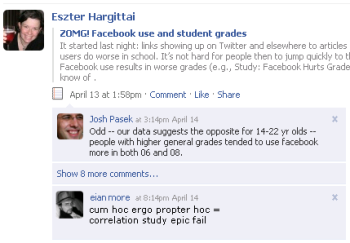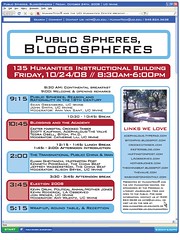In the comments thread over on Crooked Timber about homepages of academics, reader Oisin asks:
I’m a PhD philosophy student, entering my 2nd year; is maintaining a blog a good idea for a PhD student, in addition to having a homepage? Or is it perhaps a bad idea? And if so, why?
How having a blog may influence an academic’s career is a topic that’s been discussed a lot among bloggers in the past. Nonetheless, taking it up once again in light of changes in the blogging landscape makes sense. As I consider the question, I will note some significant differences among blog types and why the term “blog†has limited utility.
To blog or not to blog is not really the question. What parts of one’s self one wants to portray publicly and to a professional community is more the issue at hand.
What do I mean by “changes in the blogging landscape� The practice of blogging keeps on spreading well beyond the geeky tech-savvy realms of its initial years. I don’t just mean the practice of authoring blogs, but the understanding of what blogs are and the practice of reading them.* Given this change in who is aware of and reading blogs, maintaining one may mean something different today than it did a few years ago so I think it’s worth another discussion.
I started blogging (in May, 2002) just a few months before going on the academic job market. I don’t recall concerns about negative repercussions, but by then I had already been maintaining a mailing list with hundreds of subscribers and mainly saw the value in an activity of the sort (e.g., dissemination of ideas, meeting people) rather than potential concerns. In any case, at that time few people on hiring committees knew what a blog was much less would have been reading them so I think it is easy to argue that blogging at that point may well have influenced an academic’s career less than it might today, for better or for worse.
As I have watched blogging become more mainstream in some circles (e.g., what’s up with the recent upsurge in bloggers among sociologists?), I’ve started to wonder, again, about the potential career consequences of blogging especially given that it is sometimes done in ways I would not necessarily consider conducive to one’s career.
But the general question of whether an academic should blog is complicated. There are several issues at hand and these may all influence its desirability.
First, should one blog under one’s own name or under a pseudonym and how does this decision influence things? Next, what are the types of topics one should cover? Should one stick to or avoid research, current events, professionalization topics, teaching, personal information, pop culture, anything and everything in between? What style should one use (professional, chatty, combative, arrogant**, etc.)? What should be the frequency of posts (several times a day, every couple of days, few times a month)? These are just some of the considerations and potential variations in blogs and how they and their authors may be perceived.
It is precisely this long list of variables that makes it nearly impossible to give general advice about whether an academic (at the grad student level, junior faculty level or any other level for that matter) should or should not blog. I continue to believe that there are potential benefits to blogging, both personal and professional. However, I also think, increasingly, as I come across all sorts of blogs, that some people are likely not being helped by their blogging. For example, if you write under your own name and do so in a style that suggests you think very highly of your smarts yet your posts seem to suggest that you are not very bright then it is hard to see how that would be beneficial (but perhaps it is not detrimental either). On the other hand, if you write really smart commentary, but do so under a secret identity, it is not clear how that is going to be helpful either. (On that note I should add that it seems extremely rare in the case of academic pseudonymous blogging that the identity of the author is not revealed eventually, at least to some, which is something for folks choosing that path to keep in mind.)
So my overall advice? Be smart about your online presence, whether on blog or on email. Realize that what you write – whether under a pseudonym or not – may well be connected to you later so it should be material you are willing to stand up for in situations other than the privacy of your living room (where much of blog writing is likely drafted).
What does it mean to “be smart†in this realm? This is where people will likely disagree, which is why I hesitate to give more fine-grained advice. Personally, I find it off-putting when people’s style suggests that they think highly of themselves, but little of their writing delivers.
But styles can also add something positive to otherwise mundane topics. For example, I don’t know if early in one’s career (or any other time for that matter) is the time to advertise a series of professional rejections broadly (e.g., blog post about having been rejected from a conference followed by a blog post about having been rejected from a journal followed by a blog post about having been rejected in a fellowship application process). On the other hand, even such information could be conveyed in a way that suggests a reflective and careful thinker.
Alternatively, if a graduate student is trying to be part of a professional blogging community – that is, s/he is mainly engaging in conversation with other people from the field – then it may not make sense to focus a string of posts on something like having spent a day at the beach, a day watching football, and a day baking cookies. Nonetheless, if done in a witty, interesting and insightful way, that could be fine as well.
Perhaps where I am going with this is that if it is more likely to be a personal journal of brief notes about one’s everydays then it is not clear why it would need to be linked to a professional community (and thus I would keep the blog separate from a professional homepage and I would not necessarily link to it when commenting on blogs of colleagues). However, if one engages in topics of broader appeal then it can make sense to make that part of one’s public persona as it can be beneficial to come to be known as an interesting and careful thinker.
All of this brings me back to a point I have been making for a while (but to which I cannot find a reference at the moment, perhaps mostly having made this point in talks): the term “blog†is of limited utility as it refers to so many different genres. This applies in the academic realm as well as others. Whether an academic should or should not maintain a blog is partly dependent on how one defines, understands and approaches the writing and communicating with others. Instead of asking oneself whether one should blog, I’d ponder its intended purpose and goals, and contemplate answers to the questions I listed above.
And one important final point. Ultimately, whether one gets hired or gets a promotion will have a lot to do with one’s academic record. In that sense, much of the above may be irrelevant except to consider whether blogging is eating into one’s research time or time otherwise spent on, say, watching reruns of Law & Order (totally random example I pulled out of nowhere;).
[*] That said, I have to share one of my recent Twitter messages here: “reality check: Man taking photos of pastry in store with high-end camera, seller asks if he’s a blogger; response: what’s that?â€
[**] For the record, I don’t actually believe that many people make a conscious decision about wanting to write in an arrogant style, but some end up doing so and there is little appealing about it.
 Following up on my blog post from a few weeks ago, a couple of colleagues and I have published a formal response to the media frenzy covering the study that claimed a relationship between Facebook use and lower grades.
Following up on my blog post from a few weeks ago, a couple of colleagues and I have published a formal response to the media frenzy covering the study that claimed a relationship between Facebook use and lower grades.



